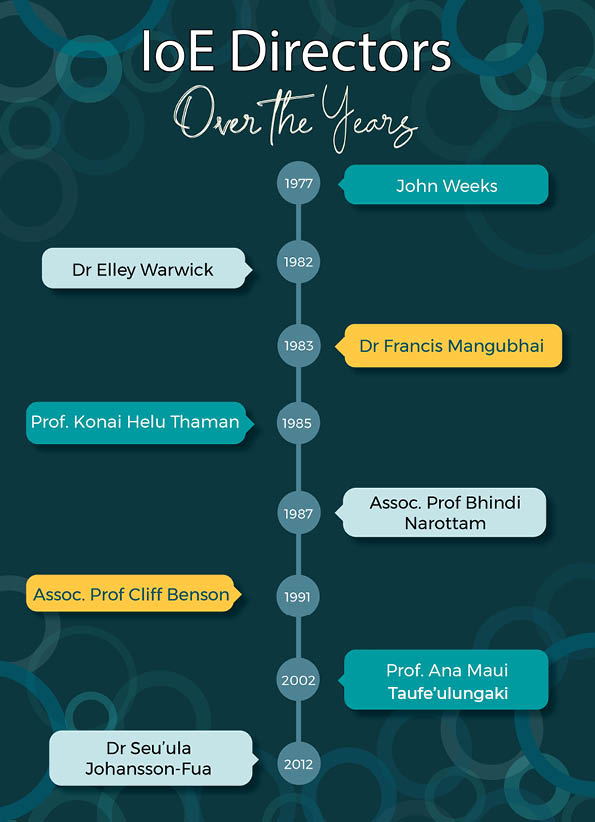History - IoE
The Institute of Education (IoE) was set up in 1975, as the ‘outreach’ arm of the USP School of Education. The core mandate of the IoE was: professional development delivery; publishing teaching and learning materials for Pacific schools; providing policy advice; conducting applied research; and providing technical consultancies. The IoE was funded through the University and additional project funds from various international agencies. The IoE Advisory Committee consisted of the Directors of Education from the University’s member states. It was out of a request from the IoE Advisory Committee that the South Pacific Board for Educational Assessment (SPBEA) was established and is now the Education Quality and Assessment Programme (EQAP).
In 2000, the USP required all Institutes to be both self-funding and tasked with financial contributions towards the USP’s main budget. To date, the IoE, like all other Institutes of the USP, has been operating on a self-funding model. In 2010, the USP Council approved the government of Tonga’s request for the IoE to be relocated to Tonga campus. At this time, the IoE was delivering the Pacific Regional Initiative for the Delivery of Basic Education (PRIDE) project, but the core IoE staff were at retirement age and the IoE was in financial difficulty. The change of funding model had had a significant and negative impact on the Institute and its core functions. Highly experienced and respected staff who were able to operate effectively under the fully funded institution, now struggled to learn entirely new skillsets to operate in the new selffunded institutional environment. The new funding model required a far more business-oriented service and in-depth understanding of educational development in the region, in addition to complex research skills and highly technical expertise. The old systems by which IoE was able to provide valued skills in developing children’s books, professional development workshops, supporting national teacher education institutions, supporting national curriculum development units, now had to be costed and bound to externally predetermined timeframes and often pre-defined deliverables and driven predominantly by external development partner agenda. As such, when the IoE was relocated to Tonga, only one staff member remained with the core team.
In 2012, with the approval of the IoE Advisory Committee, IoE set out its IoE Strategic Plan 2013 – 2015. This plan focused on re-building the institute and re-defining its operations now that it was no longer located in Laucala, Suva.
During this re-building phase, IoE had an almost 100% turn-over of the staff that were recruited in 2011. However, three key events contributed to the re-building phase:
1) Tonga government’s support through projects and research activities totaling over TOP$0.5m over this period.
2) Solomon Islands government’s support through a contract to design and deliver a professional development programme for 1500 school leaders, totaling SBD$13m/ FJD$4.5m (Appendix IoE-4), and
3) The Forum Education Minister’s Meeting (FEdMM) request for IoE/USP to set up a training mechanism for regional educational planners (Appendix IoE-5).
In 2016, with the guidance and encouragement of the IoE Advisory Committee, IoE set out to enact our IoE Strategic Plan 2016-2018. This plan focused on strengthening the core IOE team and operations now that it was operating offices in Tonga, Solomon Islands, and in Laucala, Suva. During this consolidation phase, IoE maintained its core staff, built up its pool of Research Associates and corporate staff. A key challenge during this phase was the Director’s dual responsibility for the IoE and the USP Tonga Campus. For this period, the Director was overseeing IoE’s three offices in Tonga, Solomon Islands and in Suva, in addition to USP’s Tonga Campus and USP Centres in Vava‘u and in Ha‘apai. However, this period brought five key opportunities that contributed to the further growth and consolidation of the IoE: 1) the successful transfer of the Solomon Islands school leadership programme into the Graduate Certificate for School Leaders and the completion of the programme by a total of 1083 school leaders; 2) the successful completion of the Pacific Literacy and School Leadership Programme (PLSLP) in partnership with the University of Auckland for Tonga, Solomon Islands and Cook Islands; 3) the second partnership with the University of Auckland for the delivery of the Leaders Educational Authority Programme (LEAP) through 6 provinces in the Solomon Islands; 4) the ADB funded Improving Quality Basic Education (IQBE), to which IoE contributed through 2 activities the Republic of the Marshall Islands (RMI), thus effectively opening up IoE services to the Northern Pacific; and 5) the successful re-launch of the Waka Publications Programme. At the end of the consolidation phase, the IoE has now successfully re-launched all three core Programmes that collectively meet the 1975 mandate of the IoE – research & development, professional learning, and publications. This mandate and journey is a legacy that we at the IoE are very proud of and wish to continue by strengthening these core Programmes and the IoE’s current approach to serving the region.
